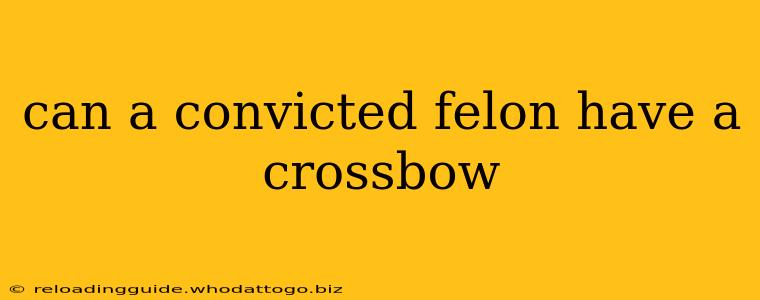The question of whether a convicted felon can legally possess a crossbow is complex and doesn't have a simple yes or no answer. The legality hinges on a variety of factors, primarily the specifics of the felon's conviction, their state of residence, and federal regulations. This article will delve into the intricacies of these laws to provide a clearer understanding.
Federal Laws Regarding Felon Firearms Possession
Federal law, specifically 18 U.S. Code § 922(g), prohibits convicted felons from possessing firearms. The crucial point here is the definition of "firearm." This is where the crossbow's legality becomes ambiguous.
While most would consider a crossbow a weapon, the legal definition of a "firearm" under federal law generally focuses on devices that expel a projectile using explosive propellant. Crossbows, using mechanical force rather than explosives, typically fall outside this definition.
This doesn't automatically grant felons unrestricted access, however. The ambiguity opens the door for state-level interpretations and the potential for prosecution based on other relevant state or local laws.
State-Specific Laws: The Crucial Variable
Each state holds the power to establish its own laws regarding weapons possession, and these laws significantly impact a felon's ability to own a crossbow. Some states might classify crossbows as "firearms" or "dangerous weapons," thereby subjecting their possession to the same restrictions as handguns or rifles. Other states may have more lenient regulations or specific exemptions.
It is absolutely vital to research the specific laws of your state. This information is usually available online through the state's attorney general's office or department of justice website. Looking up "felon firearm possession [your state]" will often yield relevant legal documents and information.
Understanding the Nuances of "Convicted Felon"
The type of felony conviction also plays a crucial role. Not all felonies carry the same restrictions regarding weapons possession. Certain non-violent offenses might not automatically preclude crossbow ownership, while others certainly would. Again, consulting legal counsel or reviewing state-specific statutes is essential for accurate interpretation.
Other Relevant Factors
Beyond the core issue of felon status, other factors can influence the legality of crossbow ownership:
- Restoration of Rights: Some states offer processes for restoring gun rights to convicted felons after a period of time or upon meeting specific criteria. This restoration might extend to other weapons, including crossbows.
- Specific Court Orders: A court may issue a specific order prohibiting a convicted felon from possessing any weapons, including crossbows, as part of their sentence. This would override any potential ambiguity in state or federal law.
Disclaimer: Seeking Legal Advice is Paramount
This information is for educational purposes only and does not constitute legal advice. The laws regarding weapons possession are intricate and vary significantly depending on location and individual circumstances. Anyone facing questions about their legal right to possess a crossbow after a felony conviction should consult with a qualified attorney in their state. They can provide accurate guidance based on the specifics of your situation and ensure you remain compliant with the law. Ignoring legal counsel could lead to severe penalties.

